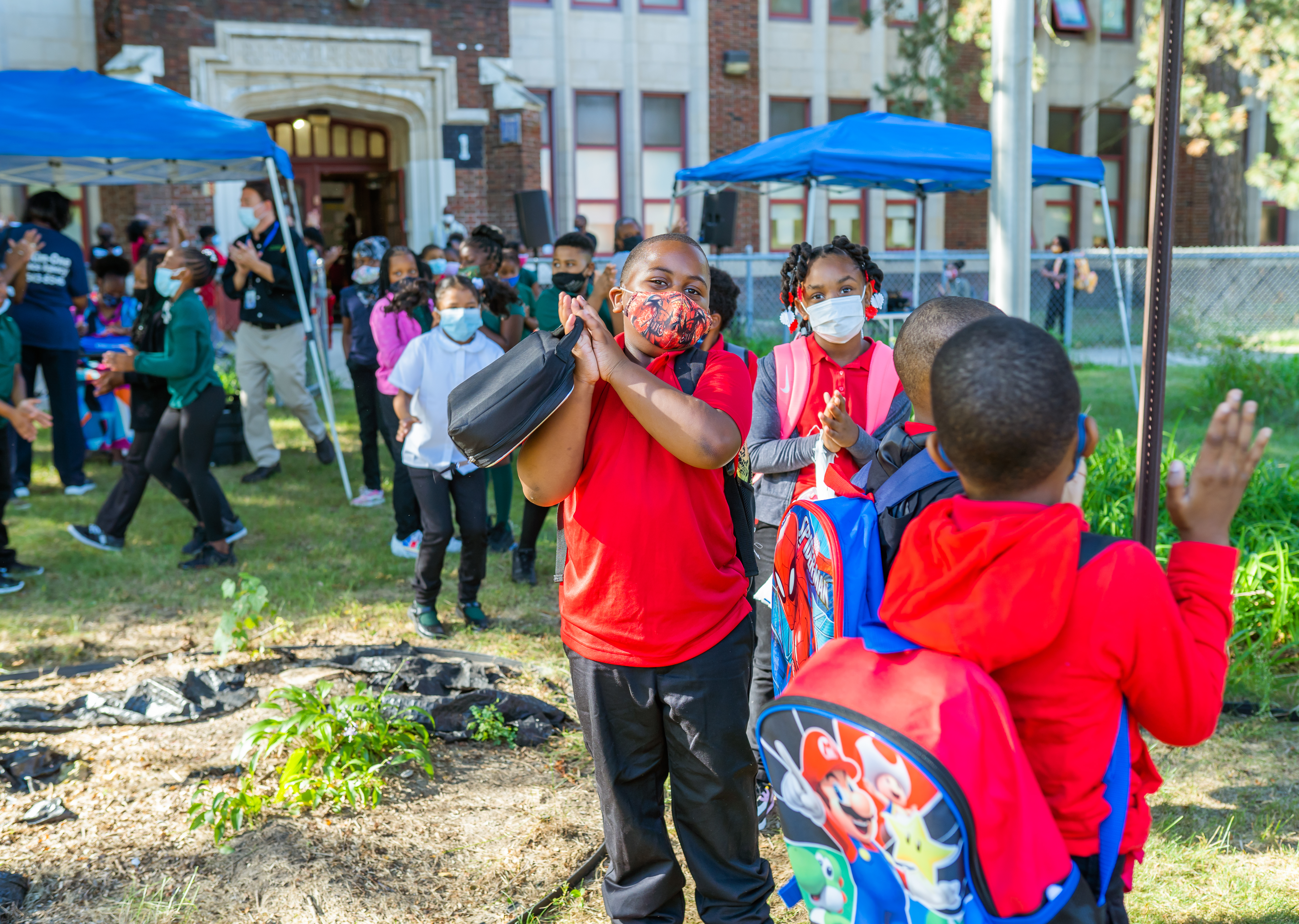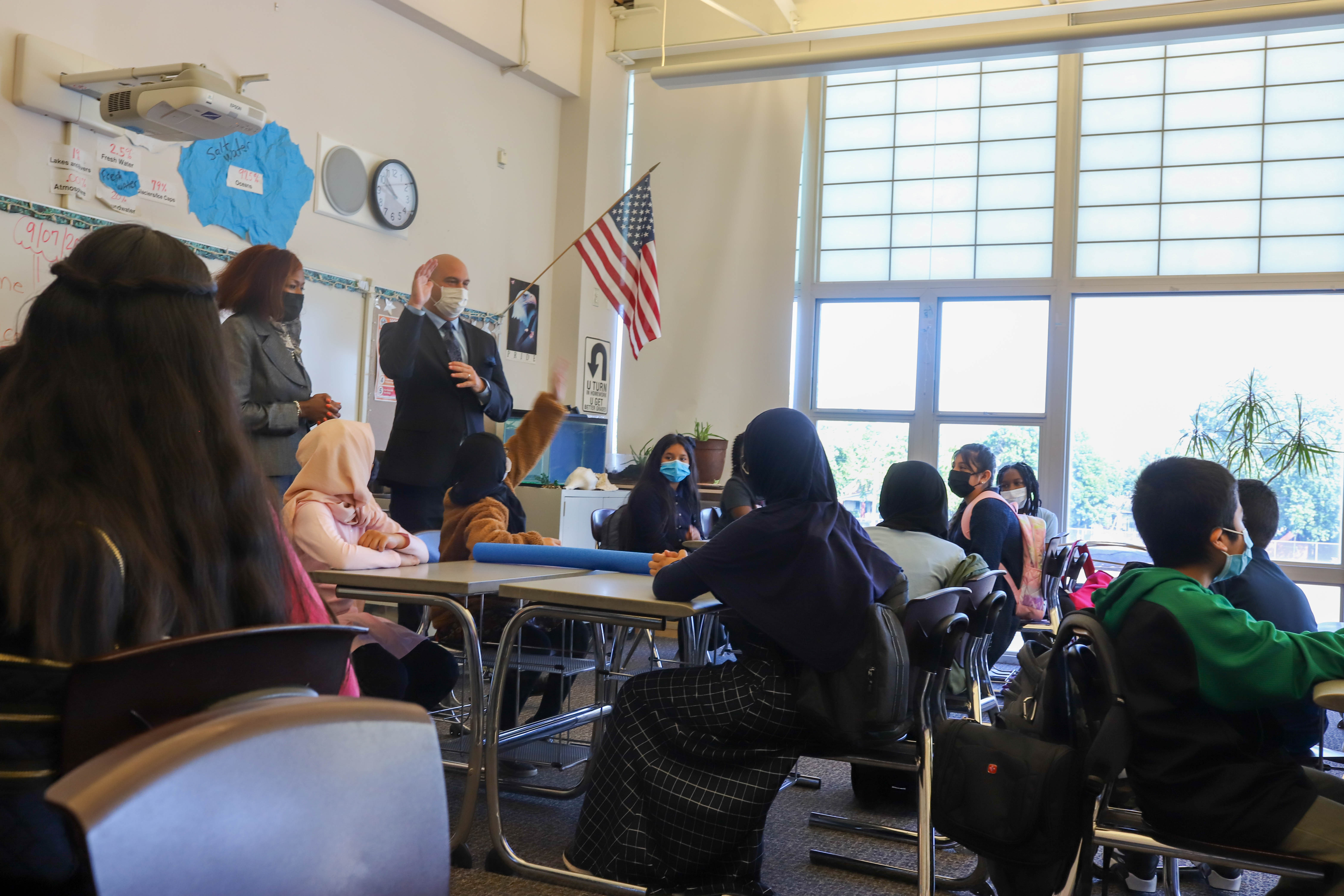Detroit students hustle into class, masked up and temperature checked

Detroit students hustle into class, masked up and temperature checked was originally published by Chalkbeat, a nonprofit news organization covering public education. Sign up for their newsletters here: ckbe.at/newsletters”
Oct. 5: First month of classes in Detroit sees virtual school challenges, demand for hourly employees continues
Sept. 14: Detroit schools are spending $70M for COVID testing. Could a vaccine mandate be next?
Tears were flowing and the music was bumping Tuesday morning at the entrance to Paul Robeson Malcolm X Academy.
Emotional moms and dads dropped their children off at school for the first time and students who hadn’t been in a classroom in over a year nervously entered the school, where joyous staff greeted families for the first day of school in the Detroit Public Schools Community District. Parents shared goodbye kisses through tear-soaked masks and teachers, who hadn’t seen their students in-person in over a year, greeted students with arms wide open.
“I am overwhelmed right now,” said Tiaris Patrick, who cried as she and Jazmere Hicks waved goodbye to their son on his first day of kindergarten.
Related:
- COVID surge has largely missed Michigan. Has the state dodged a bullet?
- Michigan: Masked or vaxxed students more likely to avoid COVID quarantine
- Which Michigan school COVID measures work? We asked scientists
The day began much the way it did a year ago: with students wearing masks, and with parents, teachers, and other school staff nervous about the spread of COVID-19, which has taken a toll on the city. But after a difficult school year in which most students learned online, most students and teachers braved their anxiety Tuesday to do what district leaders say is crucial: learn in person and in a classroom with their teachers and peers.

About 50,000 Detroit Public Schools Community District students enrolled for in-person learning in the fall 2021 semester, according to school officials. (Valaurian Waller / Bridge Detroit)
DPSCD received $1.2 billion in coronavirus aid relief, some of which went toward purchasing personal protective equipment. Administrators have assured safety measures are in place through the district’s reopening plan and a mask mandate the school board approved weeks before it became required across Wayne County. The Detroit district has encouraged members of the community to get vaccinated, but children under age 12 remain unvaccinated.
For other safety measures, the district is conducting weekly testing of employees and students whose parents provide consent. Weekly testing is required for athletes. The latter is significant given the outbreak that occurred at Renaissance High School last week, when about a dozen football players tested positive for the coronavirus.
“We knew coming in this year that our vaccination rates are low among our student-athletes, unfortunately,” Detroit Superintendent Nikolai Vitti told reporters Tuesday morning. “Our sports teams are going to be more susceptible to positive cases. That’s a risk that our coaches, our players, and their families are willing to take.”
It’s also why the district is requiring weekly testing of the athletes.
Alexis Williams, a sixth grader at Priest Elementary-Middle School, said she doesn’t mind wearing a mask because she’s worried about whether the virus will continue to spread.
“I just want to stay safe,” she said.
Alexis stood with her grandmother in a line outside Priest, waiting to enter a school building to learn for the first time since March 2020. Her big goal for the year: “Get my grades up.”
She said she had good grades before the pandemic. But last year, while enrolled at a Detroit charter school, she struggled, especially with math. Worse, she went a month without school because she didn’t have a laptop or tablet.
“It was horrible,” Alexis said, adding, “I think I only need to catch up in math.”

Dr. Jeffery Robinson, the principal of Paul Robeson Malcom X Academy in Detroit, on the first day of the fall 2021 semester. (Valaurian Waller / Bridge Detroit)
Dr. Jeffery Robinson, principal at Paul Robeson Malcolm X Academy, said, “The value of in-person learning is being underestimated.”
Robinson shut down the academy’s in-person instruction last school year, and all students became virtual learners. This year, he says, he’s conflicted and optimistic because he believes in the benefit of in-person instruction for child development.
On Tuesday, a disc jockey the school hired played hustle music every 30 minutes for elementary students to dance to on the first day. Robinson said fewer parents than usual were present for the first day of school, and he suspects more parents will choose virtual learning once again.
One such parent, Aliya Moore, left her daughter at home on Tuesday while she “checked out the scene.” As president of the Parent Teacher Association at the academy, Moore said she wants to help bring a sense of “normality” back to the student body, and plans to be on campus throughout the week to welcome students.

Students at the Paul Robeson Malcom X Academy danced to hustle music every 30 minutes on their first day. (Valaurian Waller / Bridge Detroit)
However, Moore said her sixth grader will begin the academic year in virtual school. She’s heard other parents’ concerns about returning to the classroom and their collective questions around keeping students, staff, and families safe during the pandemic.
Nicole Devezin, the guidance counselor at the academy, said she’s both nervous and optimistic about the return to in-person learning.
“I’m so happy to see so many of the children,” Devezin said. “I miss them.
“I believe we can be successful as long as we trust each other’s space and honor each other’s space.”
Devezin will lead the academy’s efforts to address the social and emotional needs of students who spent the entire school year isolated and learning at home. The efforts include activities in which in-person students will participate during the first two weeks of school followed by at least one activity each day led by teachers.
Devezin said school staff need to build trusting relationships with students before formal learning can begin.
“Right now, this year, so many have been in such a state of anxiety, a state of depression, a state of hopelessness,” she said. “Even though we are back in school, you still have to figure out your mind, your thoughts and your emotions.”
While some parents and staff have shared their worries about the return to in-person instruction, more students are enthusiastic about returning to the classroom.
“How many of you are excited to be here?” Vitti asked a group of sixth-graders at Priest Elementary-Middle. Vitti, along with school board President Angelique Peterson-Mayberry and Principal Justin Hauser, spent time at the school, visiting classrooms, talking with students and staff, and posing for photographs.

Superintendent Dr. Nikolai Vitti and Detroit Public Schools Board President Angelique Peterson-Mayberry speak with students about how excited they are to be back in school this year. (Di’Amond Moore / Detroit Free Press)
In most of the classes, students appeared eager to be back, and many said they were done with online learning. In teacher Jason Stewart’s class, Santiago Monrreal Jimenez said he was most excited for his science lessons.
“It’s one of my best subjects,” Santiago said.
Jamari Austin said he was most excited about math because, well, he just likes the subject.
The students’ answers, during Stewart’s English language arts class, had the teacher realizing he’ll need to get the kids engaged in his subject.
“I’m just going to work extra hard,” Stewart told the students.
In just about every class she visited, Peterson-Mayberry, the school board president, told students she was glad to see their faces, even if she could see only their eyes.
“We missed you, so we’re glad you’re back,” she told them.
Vitti told reporters that about 50,000 students had enrolled for the fall semester. If they all show up, he said, the district’s student count will be at pre-pandemic levels after taking a dip last school year. Enrollment dips occurred across Michigan, where schools lost more than 50,000 students.

To get Detroit students back into school, the district will be restarting it’s home visit program to canvass for students that have not enrolled. (Di’Amond Moore / Detroit Free Press)
To get kids in school, the district is planning to restart its home visit program, in which parents and district employees knock on doors. The program was a key part of the district’s outreach efforts during the last year of pandemic learning.
At Clippert Multicultural Magnet Honors Academy, Vitti and Principal Micaela Escamilla stopped outside a sixth-grade science classroom to talk about enrollment. Escamilla told Vitti that the school has 384 students enrolled, down from a little over 400 last year.
“We had about five applications that came in overnight,” she told him. “Our goal is 420.”
“You’ll get them back,” Vitti said.
Chalkbeat is a nonprofit news site covering educational change in public schools.
Michigan Education Watch
Michigan Education Watch is made possible by generous financial support from:
Subscribe to Michigan Education Watch
See what new members are saying about why they donated to Bridge Michigan:
- “In order for this information to be accurate and unbiased it must be underwritten by its readers, not by special interests.” - Larry S.
- “Not many other media sources report on the topics Bridge does.” - Susan B.
- “Your journalism is outstanding and rare these days.” - Mark S.
If you want to ensure the future of nonpartisan, nonprofit Michigan journalism, please become a member today. You, too, will be asked why you donated and maybe we'll feature your quote next time!






